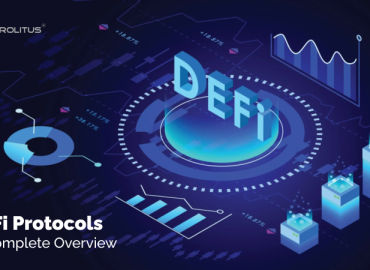Blockchain technology is spreading like wildfire as it has revolutionized several industries with its world-class technology. Along with cryptocurrencies, blockchain is all set to disrupt the financial sector for people, enterprises, banks, and governments.
Decentralized finance is changing the global financial landscape by enabling quick and efficient transactions. DeFi’s popularity in the crypto markets has created a lot of interest as tokens use smart contracts to transform conventional financial applications.
Here is the article to learn more about the fundamentals of DeFi Tokens and how you create your own token.
What is a DeFi Token?
Decentralized finance is an umbrella term for multiple businesses, including exchanges, crowdfunding, investment, trading, or voting rights. Similarly, DeFi tokens represent a diverse set of cryptocurrencies that operate using smart contracts.
DeFi tokens provide access to a suite of financial applications and services built on the blockchain. It commands a $46 billion market cap, a relatively small proportion of the overall $1 trillion cryptocurrency market. DeFi tokens have become one of the fastest-growing sectors in the industry.
For example, DAI is a USD-pegged stablecoin minted by MarkerDAO. It is the largest DeFi token by market cap. Lido Staked Ether (SETH) stands in second place, representing Ethereum which has been staked within the staking protocol Lido. It is then followed by Chainlink’s LINK, which is the native token of the decentralized oracle network.
Features of DeFi Tokens
Out of the numerous features, we will discuss some of the critical attributes of the DeFi tokens.
Access to Financial Services
DeFi tokens enable seamless access to financial services. The tokens improve the accessibility of investment and commerce opportunities to all individuals. DeFi tokens allow users to do network staking, play games, take loans, etc. They bring financial services within reach of people.
Better Stability
Since most DeFi tokens operate on the Ethereum blockchain, you can also choose to invest in Ether (ETH). It is also a significant reason for scaling the price of Ethereum through corresponding price improvements. Hence, DeFi can be the differentiator in the competition between Ethereum and Bitcoin for the top rank in market capitalization.
Explosive Growth
DeFi tokens have brought a wave of revolution that nobody wants to miss out on. It displays the potential for explosive growth and hopes to bring promising alternatives in the future. For example, Uniswap (UNI) and Maker (MKR) are two famous examples of DeFi tokens. They depict how DeFi will change the entire landscape shortly.
Use Cases of DeFi Tokens
DeFi is much more than an emerging ecosystem of projects. It represents a massive effort to create an alternative financial system on Ethereum that can compete with centralized services. Let’s look at the most prevalent use cases of DeFi tokens.
Decentralized Autonomous Organizations(DAOs)
DAOs are similar to traditional financial institutions, with decentralized bodies governing the organization. DeFi tokens provide voting rights to users to vote on basic financial operations like fundraising, asset management, and governance implementation. It helps give a sense of power to even the person holding a single token.
Asset Management
Since decentralized finance grants the control of funds in the hands of users, it brings a sense of responsibility to users. They can choose to manage their assets, such as purchasing, selling, and transferring digital assets, along with keeping their sensitive data private. Hence, asset management is considered one of the most useful DeFi applications for users.
Digital identity
Blockchain-based digital identities are receiving serious attention on the internet. However, DeFi tokens can be a game-changer in providing access to the global economic system.
Tokens vs. Cryptocurrencies:
The two most common blockchain-based digital assets are cryptocurrencies and tokens. A cryptocurrency is an asset of a blockchain network that can be used for trading, exchanging, or storing. But, tokens (also called crypto tokens) are units of value that blockchain-based organizations develop on top of existing blockchain networks.
While both share many similarities, the most significant difference between tokens and cryptocurrencies is that the former is built on an existing blockchain. At the same time, the latter has its own blockchain.
What is the demand for DeFi tokens?
As DeFi services are disrupting the field of finance, the market capitalization for DeFi tokens is increasing profoundly. DeFi runs on mutual trust and standards for protecting privacy. It covers the lender or borrower’s identity and aims to bring a change in regulatory approval for DeFi applications.
Another reason for the growing demand for DeFi tokens is the increased involvement of mainstream players. Several top financial institutions are starting to recognize DeFi alongside looking out for ways to participate. Some special asset management funds have begun to follow DeFi with serious commitment.
How to Create a DeFi Token?
Creating a DeFi token will require a lot of your time as you need to find the utility, team, token name, blockchain, initial supply, and several other factors. The steps below will give you a general idea of how to create DeFi tokens.
- Find the Purpose: It is essential to be clear on the purpose of your DeFi token and what problem it aims to solve. The tokens should solve real-life issues and bring them into the limelight among organizations and people.
- Create a token name, symbol, and logo for your DeFi token by brainstorming ideas. Also, research a couple of projects and finalize the total supply for your token.
- Choose a blockchain: After deciding the name and total supply, proceed ahead to choose a good and effective blockchain network. It is essential for launching a secure and encrypted DeFi token.
- Create a smart contract: it marks the start of the development process. Proceed ahead to create, deploy, and integrate a new smart contract for automating the process of generating DeFi tokens. Ensure that you have a valid address to enable seamless transactions between users.
- Finalize other events: You should start by creating a token transfer event and deciding on the transaction fees for transferring the tokens. We suggest you fix the lowest costs for more token usage in any exchange.
- Update your DeFi token: It is essential to update your token features, including staking and pooling options, migration, liquidity management, escrow development, and a secure wallet. Ensure you list the token on all leading exchanges to get visibility among global traders.
- Initiate a cold storage facility: It will help users to secure their tokens from unauthorized access. Ensure you have updated all the necessary information according to the investment plan and for the traders.
What should you consider while launching a DeFi platform?
Starting a DeFi platform can be exhausting, especially when you do not have a defined team and roadmap. Working on your business needs, finding a team, and devising the best ideas are essential. Ensure that you have identified and calculated your Defi token’s technical and economic credibility.
When considering tokenomics, create a solid distribution ideology and reserve a particular percentage of tokens for the creators and team members. It is not time to put your idea in place by preparing a professional whitepaper that includes technical and financial points, terms and conditions, and benefits offered to investors.
Now is the time to speed up your digital presence by forming partnerships with different groups and taking your social media accounts to the next level.
Prolitus – Leading DeFi Token Development Firm
Although the steps might seem easy in one go, they will be difficult if you lack technical expertise in developing Defi tokens. We will help you tap into limitless future possibilities with our token development services. At Prolitus, we have a team of experts that helps businesses understand and harness digital transactions through strategic DeFi token development services.
With Prolitus’s coin token development services, clients can take advantage of other features such as voting rights, buy-back rights, and retain holdings in other funds while tokenizing their assets. We offer end-to-end services for all your DeFi token development services.
Get in touch with our team to boost your DeFi token development now!
Final Thoughts
In recent times, we have all witnessed how CeFi platforms have seized people’s funds due to liquidity or other issues. It demonstrates how decentralized finance will flourish in the upcoming years, and countries will come forward to enable seamless financial transactions worldwide.
DeFi tokens are here to stay. They are making promising advancements and gaining a good presence in the financial market. DeFi tokens simplify the process of borrowing and lending. They can be used as a way to get users involved in the governance of DeFi applications.
Frequently Asked Questions (FAQs)
How do I make my own DeFi token?
To create your own DeFi token, you must find the platform's purpose or utility. Now is the time to brainstorm your token name and choose a blockchain for your DeFi token. Proceed ahead with creating a smart contract and finalizing actual events. Lastly, update your DeFi token and initiate a cold storage facility.
What is the best DeFi token?
DAI is the largest DeFi token by market cap. It is a USD-pegged stablecoin minted by MarkerDAO. Lido Staked Ether (SETH), which is in second place, is Ethereum that has been staked using the Lido staking protocol.
What are the top 5 DeFi coins?
The Top 5 DeFi coins, according to the CoinGecko website, are DAI, Lido Staked Ether, Chainlink, Uniswap, and Frax.
What is the DeFi to Eth ratio?
As an estimate, the market cap for DeFi stands at $46 billion and $192 for Ethereum. The DeFi: ETH ratio stands at 24.3% as of July 20, 2022.





